Balbharti Maharashtra State Board Class 10 Political Science Solutions Chapter 2 The Electoral Process Notes, Textbook Exercise Important Questions and Answers.
Std 10 Political Science Chapter 2 Question Answer The Electoral Process Maharashtra Board
Class 10 Political Science Chapter 2 The Electoral Process Question Answer Maharashtra Board
Political Science Class 10 Chapter 2 Question Answer Maharashtra Board
Question 1.
Choose the correct option from the given options and complete the sentences.
(1) The Election Commissioner is appointed by the …………………………. .
(a) President
(b) Prime Minister
(c) Speaker of Loksabha
(d) Vice President
Answer:
(a) President
![]()
(2) …………………………. was appointed as the first Chief Election Commissioner of independent India.
(a) Dr. Rajendra Prasad
(b) T.N. Sheshan
(c) Sukumar Sen
(d) Neela Satyanarayan
Answer:
(c) Sukumar Sen
(3) Constituencies are created by …………………………. committee of the Election Commission.
(a) Selection
(b) Delimitation
(c) Voting
(d) Timetable
Answer:
(b) Delimitation
Question 2.
State whether the following statements are true or false. Give reasons for your answer.
(1) The Elections Commission lays down the code of conduct during elections.
Answer:
The above statement is True. Reasons:
- It ensures free and fair elections.
- Maipractices during the election come under control.
- Due to the strict observance of the code of conduct in the last few’ elections, the common voters have become confident.
(2) Under special circumstances the Election Commission holds re-elections in a particular constituency for a second time.
Answer:
The above statement is True. Reasons :
- Sometimes, the representative of Lok Sabha, Vidhan Sabha or the local self governmènt resigns from his/her constituençy.
- In some cases, death of the representative occurs.
- In such special situations, the Election Commission has to conduct an election for a second time. It is called By-elections.
![]()
(3) The state government decides as to when and in how many stages the elections would be held in a particular State.
Answer:
The above statement is False. Reasons :
- The entire process of conducting elections is entrusted upon and managed by the Election Commission.
- If this responsibility is given to the state government it may adopt a biased approach.
- Hence, the Constitution has formed the Election Commission an independent body to carry out the responsibility.
Therefore, it is decided by the Election Commission as to when and in how many stages it will conduct elections.
Question 3.
Explain the concept.
(1) Reorganising the constituencies
Answer:
(1) The Election Commission of India formed constituencies for Lok Sabha and Legislative Assembly.
(2) The Election Commission had decided upon the constituencies before the first election. As the years passed, there was a lot of migration of the people for business and other activities from the villages to cities.
(3) This changed the demography to large extent. Number of voters in some constituencies reduced while in some it increased to a very great extent. This disturbed the ratio of- seats allotted as compared to population in those constituencies.
(4) Hence, the need to readjust the constituencies arose. The Delimitation Commission of the election commission does the work of reorganising or restructuring of constituencies.
(2) Midterm Elections
Question 4.
Complete the following picture.
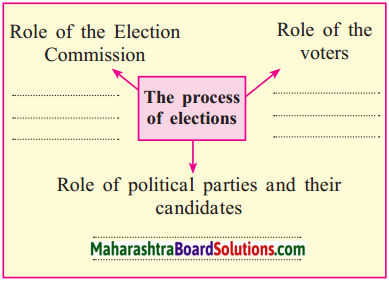
Answer:
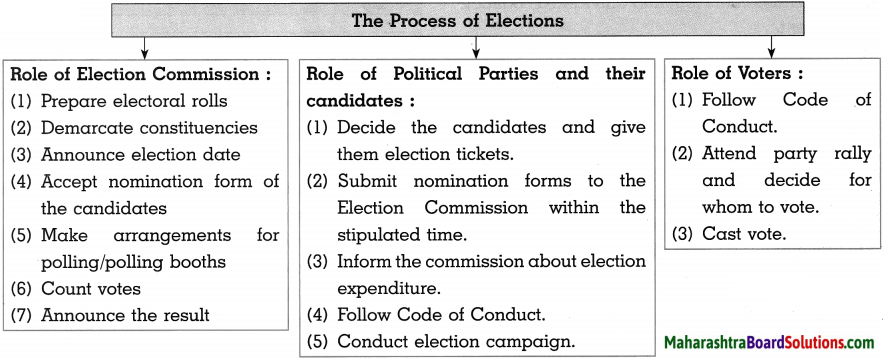
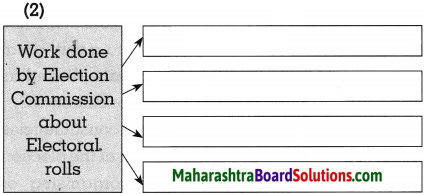
Answer:
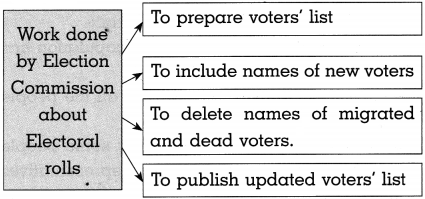
![]()
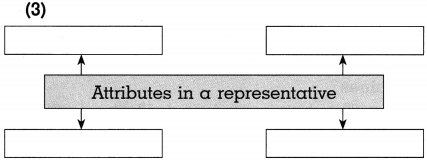
Answer:
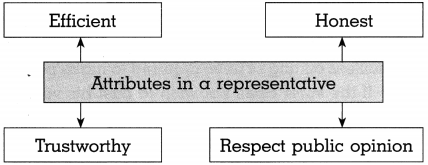
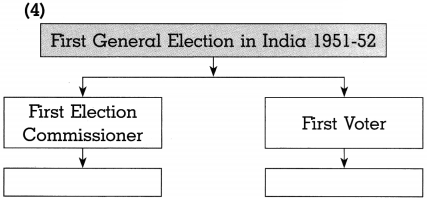
Answer:
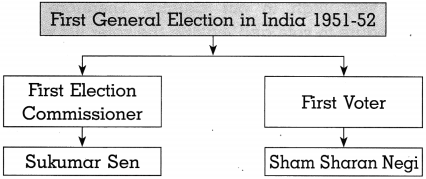
Question 5.
Answer in brief.
(1) Explain the functions of the Election Commission.
Answer:
The functions of the Election Commissipn are:
(1) Prepare the voters’ list.
(2) Decide election timetable and decide the entire process of holding elections.
(3) Scrutinize the applications of the candidates.
(4) Conduct free and fair elections and do all the work related to it.
(5) Give recognition and also de-recognize political parties.
(6) Resolve all the disputes and complaints regarding elections.
![]()
(2) Write some additional information about post of the Election Commissioner.
Answer:
(1) The Election Commission in India has one Chief Election Commissioner and two other Chief Commissioners.
(2) All the commissioners are appointed by the President.
(3) The Chief Election Commissioner of India is usually a member of the Indian Civil Service or. Indian Administrative Service.
(4) The responsibility of conducting free and fair elections to the Parliament and State Legislatures lies with the Election Commissioner.
(5) In order do safeguard the independence of the Election Commissioner, he cannot be easily removed from the post for any political reasons.
(3) Explain the meaning of Code of Conduct.
Answer:
(1) After the announcement of elections till the declaration of results, the Election Commission enforces the Code of Conduct.
(2) It explains the rules to be followed by the government, political parties candidates and voters before and during elections.
(3) Code of conduct is adopted to control malpractices during elections. It ensure free and fair ecections.
Project
Organise a mock poll in the school to understand the process of voting.
Answer:
Memory Map
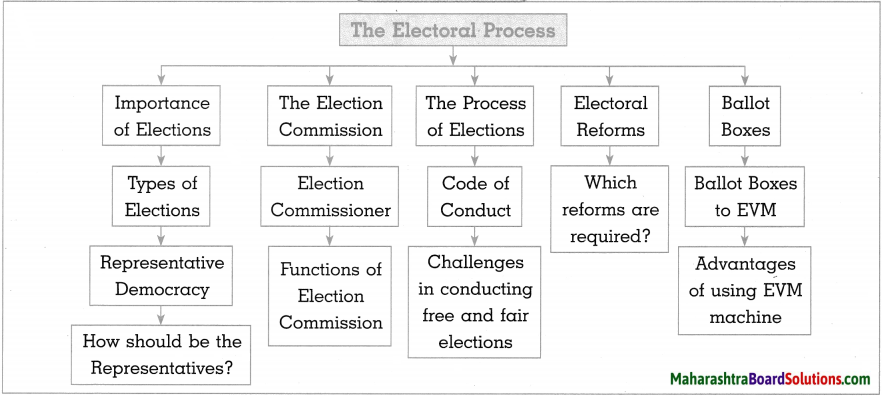
Question 6.
Choose the correct option from the given options and complete the sentences:
(a) Article of Indian Constitution created the independent body of Election Commisšion.
(a) 351
(b) 370
(c) 324
(d) 301
Answer:
(c) 324
![]()
(b) system exists in India.
(a) Single-party
(b) Two-party
(c) Multi-party
(d) No-party
Answer:
(c) Multi-party.
(c) The right to give recognition or de-recognize a political party lies with ……………….. .
(a) President
(b) Election Commission
(c) Parliament
(d) Vice-President
Answer:
(b) Election Commission
(d) There are constituencies of Lok Sabha at present.
(a) 288
(b) 350
(c) 500
(d) 543
Answer:
(d) 543
(e) from the present state of Himachal Pradesh was the first voter.
(a) Sukumar Sen
(b) Sham Sharan Negi
(c) Prem Kumar Ghumal
(d) P N. Chadda
Answer:
(b) Sham Sharan Negi
(f) Due to EVM, people can also vote easily.
(a) elder
(b) salaried
(c) Divyanga
(d) Transgender
Answer:
(c) Divyanga
![]()
(g) The first elections in India were held in
(a) 1948-49
(b) 1949-50
(c) 1950-51
(d) 1951-52
Answer:
(d) 1951-52.
Question 7.
State whether following statements are True or False. Give reasons for your answer :
(a) There should be secrecy in Election process.
Answer:
The above statement is False. Reasons :
- Election should be conducted in a free and fair environment.
- If the elections are not held in free environment then there are chances of malpractices and corruption.
- Then, it will be impossible to elect the honest and efficient candidates.
(b) The Election Commission has started awareness campaign for registration of voters.
Answer:
The above statement is True. Reasons :
- The responsibility of preparing and updating electoral roll lies with the Election Commission.
- The Election Commission starts an awareness campaign to create awareness among new eligible voters so that they register themselves in the voter’s list.
- The Indian voter is not -much aware about the election process.
- Special voter’s awareness campaign is run for voter’s registration.
- For their awareness National Voter’s Day is celebrated every year.
(c) Every candidate who fills the nomination form can contest election.
Answer:
The above statement is False. Reasons :
- Every candidate of a party or independent candidate has to be personally present to fill the nomination form.
- It is necessary for him or her to give complete information in the nomination form as decided by the Election Commission.
- The nomination forms are then scrutinized. If there are irregularities in a nomination paper and if the information is found to be false the nomination forms are rejected.
Therefore, it is not possible for every candidate who fills the nomination form to contest election.
![]()
(d) Sometimes, the Election Commission has to conduct mid-term elections. OR Explain the concept : Mid-Term Elections.
Answer:
The above statement is True. Reasons :
- If the elected government in power loses its majority before completing its term.
- If no party gets complete majority, then two or more parties come together and form a coalition government.
- Such coalition government collapses if any party withdraws the given support.
- In such situations, the government is left with no option other than resigning.
- If there is no alternative available to form government then the Parliament or Vidhan Sabha is dissolved before completing its term. In such a scenario, the Election Commission has to conduct mid-term elections.
Question 8.
Explain the following concepts :
(a) What is representation?
Answer:
Modern democracy is a representative democracy. In a democracy it is not possible to involve the entire population in the ecision-making process. This resulted in the starting of the practice of electing some people on behalf of entire population
as representatives who would run the government. The representatives who form the government are expected to be responsible to the people and give preference to the welfare of the people.
- Direct and Indirect or representative democracy rire two types of democracy.
- In modem nation-states; the population has increased to a great èxtent.
- So it is impossible to involve all the people in decision-making process.
- Thus, th practice of electing some people on behalf of entire population as representatives started.
- The elected representatives form government and work for the welfare of the people.
(b) Election Commission :
Answer:
In India, the Election Commission is central to the process of elections. Art. 324 of the Indian Constitution has established this autonomous body which consists of one Chief Election Commissioner and two other commissioners.
- One of the most important features of a democratic nation is elections at regular intervals. Holding free and fair elections at regular intervals is essential for a democratic system.
- Under the Article 324 of the Constitution, Election Commission was formed in 1950. The President appoints one Chief Election Commissioner and two additional commissioners. It is an autonomous body.
- The rank and powers of all the three commissioners are the same. The declaration of dates of the elections to the announcement of the results the entire procedure is monitored by the Election Commission.
- The Election Commission does not have its own staff to carry out this procedure. So they carry out the work with help of government employees and teachers. Special provisions are made for all finances incurred by the Election Commission.
![]()
Question 9.
Write short notes :
(a) Journey from Ballot box to EVM machine :
Answer:
- From the first election in 1951-52 till 1999, elections were held using ballot box. Twenty lakh ballot boxes were used in the first election. Voters used to cast his or her vote by stamping in front of the candidate’s name and put them in the metal boxes.
- Electronic Voting Machines (EVMs) were first used for 5 seats in Rajasthan, 5 seats in Madhya Pradesh and 6 seats in New Delhi 1998 in Legislative Assembly.
- EVM machines were used at all polling booths in the general elections held in 2004. It proved to be a very useful device.
- It has been improvised since its first use. Due to the use of EVMs the results are declared early and at a very fast rate.
(b) Recognition to Political Parties :
Answer:
- India has a multi-party system with recognition accorded to national, state and regional level parties by the Election Commission.
- Their recognition depends on the voting percentage received by them in the assembly elections and number of elected representatives of their party.
- If any party does not fulfill these criteria, its recognition is cancelled.
- The Election Commission allots appropriate symbols to parties and independent candidates. All political parties should have recognition of the Election Commission.
Question 10.
Complete the concept map :
(a) Prepare a flow chart on the process of election.
Answer:
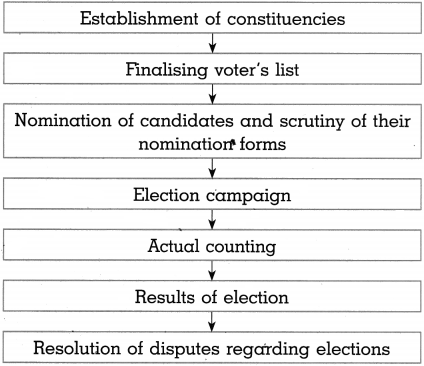
![]()
(b) Which two conditions among following is the violation of code of conduct?
(1) The candidate distributes items of household use. –
(2) Promises made to resolve the water problem if elected.
(3) To go from door to door to meet voters and request them to vote.
(4) To appeal on the basis of caste and religion to get support.
Answer:
(1) The candidate distributes items of household use.
(2) To appeal on the basis of caste and religion to get support.
Question 11.
Answer in brief :
(a) Why is it important to conduct elections?
Answer:
It is important to conduct elections because of the following reasons :
- The existence and working of democracy depends on elections.
- All political parties get a chance to rule.
- Elections help to bring a change in power through peaceful meAnswer:
- It not only changes government policies but also society.
(b) What are the conditions for voting?
Answer:
The following are the conditions for voting:
- The person should be a citizen of India.
- He should have completed 18 years of age.
- His name should appear in voters’ list.
- The person should have photo identity card issued by the Election Commission of India.
(c) What action is taken by the Election Commission if disputes arise regarding elections?
Answer:
- If any disputes arise regarding the elections, the Election Commission is empowered to take final decisions.
- The Election Commission conducts a thorough inquiry about the said dispute.
- If there is evidence of any malpractices during elections, in any constituency, it declares the elections invalid and announces re-polls.
- If any candidate breaks the code of conduct and contests elections, he/she is barred by the Election Commission from contesting elections.
(d) What challenges are faced by the Election Commission to conduct free and fair elections?
Answer:
The following challenges are faced by the Election Commission tcx conduct free and fair elections :
- Managing the large geographical landscape and huge electoral population.
- To stop misuse of money and muscle power during elections.
- Barring candidates with criminal background from contesting elections.
- Conducting elections successfully in politically criminalised environment.
- Conducting elections in spite of increasing instances of violence and making them a success.
![]()
(e) What are the advantages of EVM machines?
Answer:
The battery operated Electronic Voting Machine (EVM) has more advantages than the ballot box. They are as follows :
- It saves tonnes of paper used to make ballot paper.
- So, it conserves the environment as it stops the reckless cutting of trees required to make paper.
- If the voter does not wish to cast his vote in favour of any candidate contesting, he can make use of NOTA (None Of The Above).
- It makes counting of the votes much faster which enables the election officer to declare result in a short time.
- It is helpful for disabled (Divyanga) people to cast vote.
(f) Explain the features of procedures of voting during the first Lok Sabha Election.
Answer:
- It was a challenge to prepare voters’ list at the time of the first election. Illiteracy rate was very high in our country. Therefore, the procedure to vote and making the voter list was a challenge.
- 20 lac steel boxes were made and election symbols of political parties were stuck on it.
- Blank ballot papers were given to the voters and they were supposed to drop in the box having the election symbols of the party they decide to vote for.
- Even the illiterate people could vote because of this system.
Question 12.
Give your opinion :
(a) When candidates have only the condition of age, why should they give other information to Election Commission? Answer:
- While filling the form candidates should reveal information about his property assets and if there are any criminal charges against him.
- When candidates have only the condition of age as eligibility, why should they give other information to election commission?
- Why are the candidates required to give the information of their property to Election Commission?
- Such candidates if elected can misuse power and amass wealth with corrupt practices.
- With criminal background they can even threaten voters to vote for him.
- His nomination could get cancelled based on the information.
(b) Why is it so?
(A) Some constituencies are reserved for scheduled castes and scheduled tribes.
Answer:
- It is difficult for the people of scheduled castes and scheduled tribes to get representation as they are scattered in different parts.
- Without a representative it is difficult to discuss their problems in Parliament.
- Lack of representative will hinder their progress. Hence some constituencies are reserved for scheduled castes and scheduled tribes.
- Some constituencies are kept reserved for Scheduled caste and Scheduled tribes.
- Every political party has an election symbol.
- At the time of voting and counting of votes, the official representatives of political parties remain present.
- Recognised parties have equal opportunity to present their side before media such as television and radio.
![]()
(B) Why every political party has an election symbol?
Answer:
- After independence, the literacy rate was quite low in India.
- It was not possible for the voters to read the name of the candidate and vote.
- Therefore, the Election Commission gave symbols to political parties and independent candidates which helped the voters to identify and decide whom to vote for.
(C) At the time of voting and counting of votes, the official representatives of political parties remain present.
Answer:
- There are incidences of duplicate voters who register in multiple constituencies.
- There are cases of rigging of EVM or booth capturing.
- Such incidences are brought to light by representatives who are present at polling centres.
- During the counting process, if the EVM machine looks tampered, the representative can raise an objection.
(D) All recognised parties should get an equal opportunity to express their opinion on media such as television and radio.
Answer:
- All political parties should get a fair chance to express their agenda.
- Their ideas and philosophy should reach the people.
- Television and radio are owned by the government.
- Political parties have equal right on both.
- Hence, all the recognised parties can express their opinion on Doordarshan and Radio.
(c) Think!
(A) How political parties suffer due to family monopoly in the party? OR What are the disadvantages of dynasty rule?
Answer:
- If only one family has domination on the political party because of dynasty rule then others are not given leadership opportunity.
- It is impossible to have all the members of the family efficient. An inefficient heir can cause damage to the party.
- The growth and expansion of party comes to a halt because of such heir. His faults seep into the party making it weak in the long term.
- The nature of such a party become dictatorial. Opposing views are suppressed and the internal democracy in the party vanishes.
- If the heir does not have progressive thoughts then the party becomes regressive and of obsolete ideology.
- How political parties suffer due to family monopoly in the party?
- What do you understand by the system of ‘one vote one value’?
(B) What do you understand by the system ‘One Vote One Value’?
Answer:
- There is great importance in political and social equality in democracy.
- According to this ideology, ‘One Vote One Value’ is very important.
- In a democracy, each vote has the same value. The value of the vote of a Prime Minister and a common man is same.
- Under military rule or dictatorship or during monarchy the value of a vote for privileged classes was more. There was no importance given to the vote of the common man.
- ‘One Man One Vote’ indicates all the people in the country have same status. This is the gift of democracy.
![]()
(d) Voting is our duty as well as responsibility to vote.
Answer:
- It is enshrined in the fundamental principles of our Constitution to vote.
- It is not only our duty but also responsibility.
- Democracy exists because of elections. People should elect honest and efficient representatives through election.
- If voters show no interest in voting then the government will ignore people’s welfare.
- Hence I feel it is not only the duty of every citizen to vote but also his responsibility.
- Government has to observe the code of conduct declared by the Election commission.
(e) What measures should be taken to increase the credibility of elections?
Answer:
To increase the credibility of elections the following measures should be taken :
- 50% seats should be reserved for women candidates by every party.
- Candidates with a criminal background should be permanently barred from contesting any elections.
- The misuse of money should be stopped during elections. The government should incur the expenditure.
- Candidates who resort to malpractices should be immediately booked. A strict inquiry and action should be taken against them by the court.
- Laws and regulations should be followed strictly by the political parties before giving election tickets.
- If the political parties do not co-operate with the above terms, the Election Commission should cancel their recognition.
![]()
(f) Which rules would you include in Code of Conduct for voters?
Answer:
The following rules should be included in Code of Conduct for voters :
- The voters who abstain from voting should be fined and government should suspend all the facilities given to them.
- If it is proved that the voter has accepted money or any kind of gifts, he should be punished.
- The action of voters should not instigate common people.
- They should not involve in bogus voting.
- They should not resort to illegal means for voting.
- The candidate distributes items of household use.
- Promise made to resolve the water problem if elected.
- To go from door to door to meet voters and request them to vote.
- To appeal on the basis of caste and religion to get support.
10th Std Political Science Questions And Answers:
- Chapter 1 Working of the Constitution Class 10 Political Science Questions And Answers
- Chapter 2 The Electoral Process Class 10 Political Science Questions And Answers
- Chapter 3 Political Parties Class 10 Political Science Questions And Answers
- Chapter 4 Social and Political Movements Class 10 Political Science Questions And Answers
- Chapter 5 Challenges faced by Indian Democracy Class 10 Political Science Questions And Answers